
Asia Pacific Sustainability & Innovation Week 2025
Explore highlights, reflections, and thought pieces from the Asia Pacific Sustainability & Innovation Week 2025 – where ideas meet impact.

The Heart of Leadership: Building a Circle of Purpose

The Heart of Leadership: Building a Circle of Purpose
When I was invited to serve as Chairman of the Asia Pacific Sustainability CEO Circle #APSCC, I felt more than just honoured — I felt humbled.
Because this Circle is not merely an assembly of titles and accolades; it is a gathering of hearts, of minds, and of purpose.
Each person here has walked the talk of sustainability in their own way — and now, we come together not to compete, but to complete one another.
The Asia Pacific CEO Circle is a rare kind of space — a safe harbour where leaders can take off their armour and speak with honesty.
It’s not about who has the biggest numbers or the grandest initiatives.
It’s about what we can learn from each other — the triumphs that inspire and the struggles that remind us we are all human.
Here, we share not just success stories, but the stories behind...
Desserts
10 Pie Recipes to Try This Fall
Make this yours. Click here to edit the text and include any relevant information.

Mains
A Pasta Hack That Will Transport You to Rome
Make this yours. Click here to edit the text and include any relevant information.
.jpg)
Drinks
The Health Benefits of Drinking Tea Daily
Make this yours. Click here to edit the text and include any relevant information.

Healthy
Creative Salad Ideas for the Veggie Lover
Make this yours. Click here to edit the text and include any relevant information.
.jpg)
The Asia Pacific Sustainability CEO Circle #APSCC

The Asia Pacific Sustainability CEO Circle #APSCC is not just another business club — it’s a living, breathing community of changemakers.
Built by the SustNET Sustainable Business Network, it brings together CEOs who have already proven their leadership in sustainability through the Asia Pacific Sustainability Conference’s CEO Awards.
In short, it’s a gathering of doers, not talkers — leaders who have walked the sustainability talk and now come together to chart what comes next.
At its core, the Circle functions as a trusted, closed-door forum for meaningful exchange.
Here, leaders can drop their corporate guard and speak honestly about the challenges and opportunities of sustainability — the “E,” “S,” and “G” of Environmental, Social, and Governance.
Discussions are not about lofty ideas but about real-world action: how to reduce carbon footprints, build ethical supply chains, and embed social responsibility into business DNA.
Why does this matter?
Because leadership can be lonely — especially when you’re leading change.
The Circle provides a space where peers understand both the pressure and the purpose.
It’s a reminder that sustainability is not just a corporate checkbox but a shared human responsibility.
The conversations here ripple out — influencing boardrooms, policies, and communities across Asia Pacific.
For new inductees, the value is immense.
You gain access to collective wisdom, cross-industry insights, and collaborations that can spark breakthroughs.
And the Circle gains, too — every new member brings fresh energy, ideas, and experience that make the community stronger. It’s mutual growth in action.
Beyond the 5Ps of sustainability by GPM (Green Project Management®) — People, Planet, Prosperity, Partnership, and Peace — the Circle enriches every part of our lives.
It helps us lead with empathy, act with courage, and connect with purpose.
It reminds us that being a CEO isn’t just about running a company; it’s about shaping the future — responsibly, inclusively, and sustainably — together.
In essence, the Asia Pacific CEO Circle isn’t just a network.
It’s a movement — one conversation, one collaboration, and one courageous idea at a time.
- by Dr. Daniel Ng, Chairman of the Asia Pacific Sustainability CEO Circle (APSCC)
Sustainix: Building a Future of Trust, Technology, and Sustainability through Sepakat SeRumpun
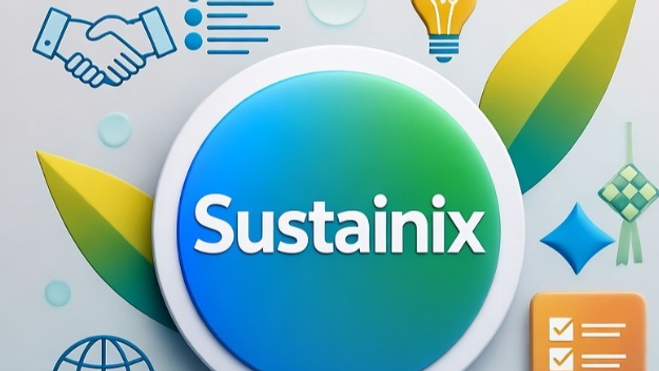
💥 In a world awash with “eco-friendly” claims, the real sustainability challenge is no longer awareness — it’s trust. Businesses across Southeast Asia talk about being green, yet many struggle to prove it.
#Sustainix was created to solve this problem. It is a groundbreaking platform that integrates blockchain technology with sustainability frameworks, ensuring that environmental claims are not just stated but traceable, trackable, and trustable (3T).
The platform’s first project, #BeyondWaste, tackles one of the region’s most urgent challenges — waste management.
By auditing businesses’ practices, issuing digital sustainability certificates, and recording them immutably on the Mandala Chain blockchain, Sustainix provides tamper-proof verification accessible through a public dashboard.
Consumers, regulators, and investors can instantly scan a QR code to check a company’s real-time sustainability status, turning vague promises into verifiable action.
What sets Sustainix apart is its collaborative foundation. Developed under the Sepakat SeRumpun partnership — a natural alliance between Baliola (Indonesia), SustNet (Malaysia), and Omni Integra (Singapore) — it demonstrates how cross-border cooperation can address shared sustainability challenges.
By combining Indonesia’s grassroots innovation, Malaysia’s sustainability expertise, and Singapore’s digital leadership, Sustainix offers a scalable model for environmental accountability.
Beyond waste, Sustainix can transform other vital sectors. In food hygiene and safety, it can track processes from farm to fork, ensuring compliance and transparency. In food security, it can certify biodynamic agriculture and verify sustainable supply chains.
It can even measure circular economy performance, helping businesses transition to more efficient resource use.
Sustainix is more than a platform — it’s a movement. It empowers MSMEs, builds consumer confidence, and strengthens ESG credibility. By making sustainability measurable and verifiable, Sustainix lays the groundwork for a future where trust drives change — uniting technology, environment, and nations for the generations to come.
- by Dr. Daniel Ng, Chairman of the Asia Pacific Sustainability CEO Circle (APSCC)
Quick Catch Up with Prof. Dr. H. Obsatar Sinaga
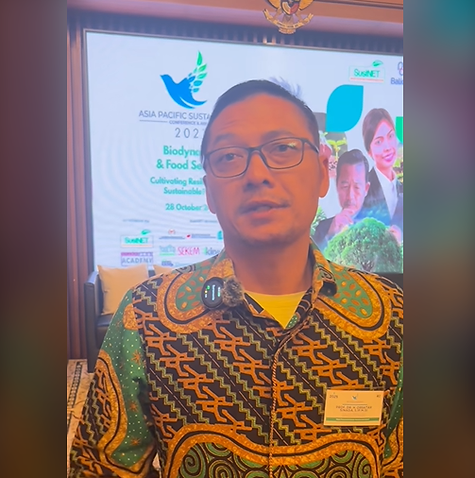
I had a quick catch up with PROF. DR. H. obsatar sinaga, Chief Executive Officer Universitas Padjadjaran
We had a chance to discuss the challenges in education on sustainability!
- by Dr. Daniel Ng, Chairman of the Asia Pacific Sustainability CEO Circle (APSCC)
Sustainix Transforms The Idea Of “Green And Smart” Into Measurable Impact

#Singapore’s journey toward becoming a leading green and digital hub is built on its commitment to integrity, innovation, and inclusion.
As the nation accelerates its Smart Nation and Green Plan 2030 initiatives, one critical gap remains—verifiable, transparent tracking of sustainability actions across industries.
#Sustainix can bridge this gap by serving as Singapore’s unified sustainability check-and-trace platform, linking data, accountability, and innovation into one trusted system.
Imagine local fashion designers using traceable materials, food producers ensuring responsible sourcing, and smart estates digitally tracking energy efficiency and waste reduction—all verified through a transparent digital dashboard.
Sustainix enables this by combining blockchain-backed certification with real-time monitoring, ensuring that sustainability claims are verifiable and aligned with national #ESG and carbon-neutral targets.
For example, hawker centers could use the platform to trace food waste management and energy-saving measures, while logistics firms could track carbon emissions across their delivery networks.
Urban farmers in rooftop or vertical gardens could validate sustainable growing practices, and developers could document green building compliance.
Each verified effort contributes data to a shared sustainability ecosystem—accessible to consumers, regulators, and investors through a single QR-enabled dashboard.
The integration of Sustainix with Singapore’s broader smart infrastructure—such as digital identity, e-invoicing, and open data systems—can make sustainability traceability part of everyday business operations.
SMEs, often burdened by reporting requirements, can simplify compliance while gaining international credibility.
By turning sustainability into an open, verifiable layer of trust, Singapore can lead the region in combining digital governance with environmental accountability.
Sustainix transforms the idea of “green and smart” into measurable impact—empowering businesses, communities, and government agencies to co-create a nation where technology, transparency, and trust converge to build a resilient, future-ready Singapore.
- by Dr. Daniel Ng, Chairman of the Asia Pacific Sustainability CEO Circle (APSCC)
Dr. Daniel Ng Presenting AI in Sustainability and Tourism

Glad to be presenting AI in Sustainability and Tourism at the #Bali #Blockchain Summit 2025 hosted by Baliola - a partner of Graphen.
- by Dr. Daniel Ng, Chairman of the Asia Pacific Sustainability CEO Circle (APSCC)
Pakatan SeRumpun: Building Climate Resilience Through Actionable Sustainability

Pakatan SeRumpun: Building Climate Resilience Through Actionable Sustainability
Climate Risk Management (CRM) is no longer a theoretical framework—it’s a survival strategy.
For Southeast Asia, where rising sea levels, unpredictable weather, and food insecurity threaten livelihoods, CRM must be embedded across all sectors.
This is precisely where the #PakatanSeRumpun alliance—comprising SustNET Sustainable Business Network (#Malaysia), Baliola (#Indonesia), THINKPLUS CONSULTING, and Omni Integra (#Singapore)—creates real value.
The SeRumpun collaboration transforms climate resilience from policy ambition into practical, measurable action through shared technology, education, and data trust.
Its #blockchain-powered platform, #Sustainix, enables traceable, transparent monitoring of environmental practices, ensuring that every initiative—from waste management to agriculture—contributes meaningfully to the UN Sustainable Development Goals (SDGs).
For example, under SDG 2 (Zero Hunger), SeRumpun’s focus on biodynamic agriculture in Bali and Malaysia demonstrates how CRM can support food security by promoting soil regeneration, waste reuse, and water efficiency.
Sustainix helps farmers record and validate these practices, giving them credibility with consumers, investors, and regulators.
In cities, aligned with SDG 11 (Sustainable Cities & Communities), SeRumpun promotes urban waste reduction and circular economy initiatives, helping municipalities plan more resilient and climate-smart communities.
#Indonesia’s #BeyondWaste program, powered by Sustainix, offers a tangible example—turning waste data into insight for better urban resilience.
Meanwhile, Baliola’s blockchain expertise ensures transparent governance for sustainability projects, while SustNet and Think Plus drive education and certification for “competent persons” in sustainability—building the human capital essential for long-term climate risk management.
Ultimately, SeRumpun’s cross-border synergy aligns with SDGs 14 and 15, protecting life on land and below water through data-driven ecosystem monitoring.
By fusing technology, trust, and collaboration, Pakatan SeRumpun transforms CRM from a defensive strategy into a catalyst for growth, resilience, and shared prosperity—anchoring Southeast Asia’s path toward a sustainable and climate-secure future.
- by Dr. Daniel Ng, Chairman of the Asia Pacific Sustainability CEO Circle (APSCC)
Biodynamic Tour Was Not Just A Visit—It Was An Awakening
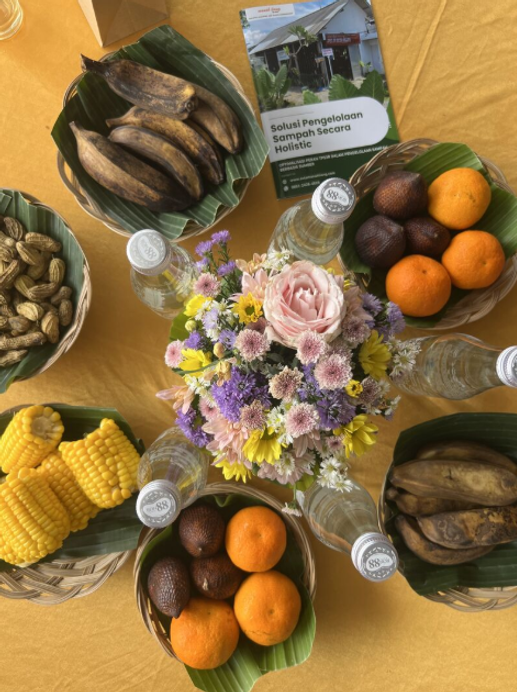
Yesterday’s #Biodynamic Tour was not just a visit—it was an awakening.
Amid #Bali’s lush greenery, participants were welcomed with freshly harvested edamame, golden corn, ripe bananas, crunchy ground nuts, buah salak, and lemon grass–infused tea.
Every bite told a story of sustainability lived, not lectured—a story where food, soil, and community exist in perfect symbiosis.
What made the experience extraordinary was not the freshness of the produce, but the philosophy behind it.
Here, farming is more than production—it is regeneration.
Each crop is part of a closed-loop ecosystem where nothing is wasted.
The soil is nourished by natural compost made from farm residue and livestock manure; waste becomes fertility, and fertility becomes food again. It is nature’s quiet economy, practiced with respect rather than exploitation.
In this biodynamic model, sustainability moves from theory to daily ritual. Food isn’t just consumed—it’s cycled back into life.
Banana peels feed compost pits; leftover corn husks return to the soil; even animal dung is treasured as a gift, not discarded as waste.
Every element has purpose, every action echoes stewardship.
But the deeper beauty lies in the community it sustains.
The farmers, workers, and families here share more than labor—they share ownership of the ecosystem they nurture.
Through programs like giving cows to employees in exchange for compost manure, livelihoods and learning intertwine.
This is not just farming; it’s social regeneration. The community grows together—economically, ecologically, and emotionally.
This is what real sustainability looks like: hands in the soil, hearts in the mission, and harmony in the outcome.
It proves that biodiversity is not an abstract goal, but a way of living that reconnects us to the land and to one another.
In a world chasing technological fixes, this biodynamic village reminds us that the most sustainable innovations often begin with care—care for the earth, care for people, and care for the future.
- by Dr. Daniel Ng, Chairman of the Asia Pacific Sustainability CEO Circle (APSCC)

We - Ts Dr Norsaidatul Mazelan and I - are grateful and honoured to meet a wonderful community of like-minded leaders and the Vice Mayor of Denpasar at the #Bali #Blockchain Summit 2025, thanks to the gracious invitation of Pak I Gede Putu Rahman Desyanta of Baliola and Bali Blockchain Center
- by Dr. Daniel Ng, Chairman of the Asia Pacific Sustainability CEO Circle (APSCC)

The “Beyond ESG” report by MGC presents a transformative roadmap for rethinking sustainability — not as a compliance requirement, but as a driver of innovation, inclusion, and long-term value.
When adapted to Southeast Asia, its insights become even more relevant, as the region faces intertwined challenges of rapid industrialization, resource strain, and social inequality.
At the core of the report is the idea of moving from ESG to “Impact Intelligence” — measuring not just environmental metrics, but social and governance outcomes that directly affect livelihoods.
For Indonesia, this means expanding green financing beyond large corporations to smallholder farmers, empowering them through platforms like hashtag#Sustainix, which provides traceable, transparent certification for sustainable practices.
This approach can be piloted through #APSCA’s Biodynamics and Food Security agenda, linking technology and tradition to build regenerative agricultural ecosystems.
In #Malaysia, where SMEs form the backbone of the economy, the “Beyond ESG” model can enhance competitiveness through measurable sustainability performance.
The Pakatan SeRumpun collaboration—involving SustNET Sustainable Business Network, THINKPLUS CONSULTING, Omni Integra, and Baliola —can help Malaysian businesses integrate ESG standards with AI-driven data collection and blockchain verification.
This reduces reporting complexity and boosts investor confidence.
For Singapore, the focus shifts to ESG as a strategic innovation tool.
The report’s emphasis on data-driven decision-making aligns with Singapore’s leadership in digital infrastructure and green finance.
By working through APSCA and Sustainix, Singaporean companies can help set regional benchmarks for ethical AI, circular economy models, and decarbonisation pathways.
In essence, “Beyond ESG” calls for shared accountability and measurable impact.
Through APSCA and the Pakatan SeRumpun alliance, Southeast Asia can move from fragmented ESG adoption to a unified sustainability ecosystem — one that connects policy, technology, and community development.
This is not just about compliance; it’s about co-creating a resilient, equitable, and thriving regional future.
- by Dr. Daniel Ng, Chairman of the Asia Pacific Sustainability CEO Circle (APSCC)
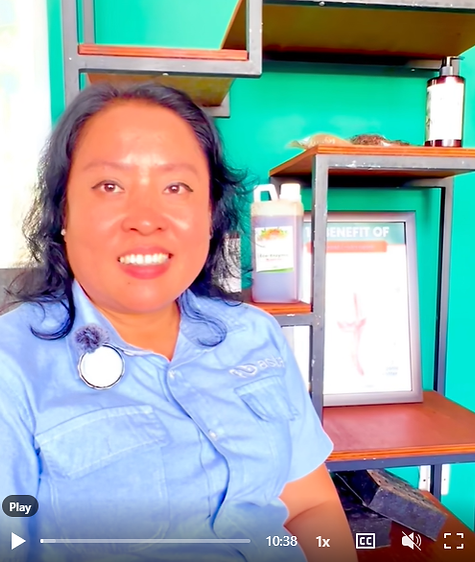
It is my great honour and privilege to interview Ibu Putu Swesty Prahayani of Asta Manah Liang https://lnkd.in/g3NTFnjf , a humble leader and a practioner of #Biodynamics and #FoodSecurity, and the launch partner for #Sustainix, a #blockchain platform developed by the tripartite SeRumpun partners of Baliola, THINKPLUS CONSULTING & SustNET Sustainable Business Network, and Omni Integra.
Kudos also goes to Pak Putu Gede Indra for his creative leadership!
Watch/Listen on to find out how waste, earthworms, cows feature so highly in this ecosystem that builds communities, collaboration in making sustainability transform from slides to show! And traceability, trackability, with technology makes trust!
- by Dr. Daniel Ng, Chairman of the Asia Pacific Sustainability CEO Circle (APSCC)

In today’s world of sustainability investing, ratings are the currency of credibility—but not all ratings are created equal.
The OECD - OCDE’s Behind ESG Ratings: Unpacking Sustainability Metrics (2025) report exposes a striking truth: much of what’s measured in #ESG today reflects intentions, not outcomes.
Over two-thirds of metrics are input-based, focusing on policies and commitments rather than real-world impact.
Only 17% measure actual performance, while a mere 7% extend to the supply chain—leaving gaping blind spots in accountability.
This matters deeply for Southeast Asia, where economies are fast-growing yet unevenly regulated.
From palm oil plantations in #Malaysia to textile factories in #Vietnam and fisheries in #Indonesia, sustainability challenges are complex and interconnected.
A company may have a stellar ESG score but still rely on opaque, unverified data.
This undermines trust and hinders both investors and policymakers seeking genuine impact.
Here’s where #Sustainix offers a breakthrough.
By using blockchain technology to record sustainability actions in real time, it transforms ESG verification from a static score into a living, traceable system of truth.
Every data point—whether from waste management in #Bali, renewable energy in the #Philippines, or carbon farming in #Thailand—can be timestamped, audited, and verified independently.
For example, a coffee cooperative in Vietnam could use Sustainix to track its entire value chain—from bean to export—proving fair trade and environmental compliance with immutable data.
In #Singapore, an SME in clean manufacturing could link its energy efficiency results directly to verified metrics, not just declarations.
As ESG matures into a trillion-dollar industry, trust will define its future. Sustainix turns transparency into a shared asset, allowing stakeholders to see not just what companies promise, but what they actually perform.
In doing so, it elevates ESG ratings from numbers on paper to proof of purpose—authentic, accountable, and built for Southeast Asia’s next sustainable leap.
- by Dr. Daniel Ng, Chairman of the Asia Pacific Sustainability CEO Circle (APSCC)

#Malaysia’s pursuit of sustainability is entering a new phase—one that demands proof, not promises.
From artisanal batik makers in #Kelantan to palm oil producers in #Sabah, and from urban recycling programs in #KualaLumpur to agrotech farms in #CameronHighlands, the challenge is no longer about intent but credibility.
Sustainix offers a breakthrough solution—a digital system that tracks and traces sustainability practices with full transparency, ensuring that every claim can be verified and every effort recognized.
Using blockchain technology as its backbone, Sustainix records sustainability actions in real time, creating a tamper-proof trail of accountability.
A batik cooperative, for instance, can document its use of natural dyes and water recycling; a palm oil mill can prove adherence to zero-burning policies and fair labor practices; a recycling facility can transparently show its collection, sorting, and processing flow—all visible through a traceable dashboard accessible via QR code.
This verified data not only builds trust but also connects Malaysia’s sustainability agenda to global ESG benchmarks.
For government agencies, it can integrate into national green procurement systems or local council compliance programs.
For businesses, it provides a competitive edge in export markets where environmental verification is now a prerequisite.
Beyond individual industries, Sustainix supports Malaysia’s broader vision of smart and sustainable cities.
By connecting verified sustainability data from waste management, urban farming, transportation, and energy sectors, local authorities can gain real-time insights to drive policy decisions and community participation.
Malaysia’s strength lies in its diversity—of people, industries, and ecosystems.
#Sustainix bridges these elements into a single ecosystem of trust, where technology amplifies tradition, and local innovation meets global accountability.
In doing so, it empowers Malaysia to move beyond declarations and toward demonstrable, traceable, and inclusive sustainability—paving the way for a greener, smarter nation ready for the future.
- by Dr. Daniel Ng, Chairman of the Asia Pacific Sustainability CEO Circle (APSCC)
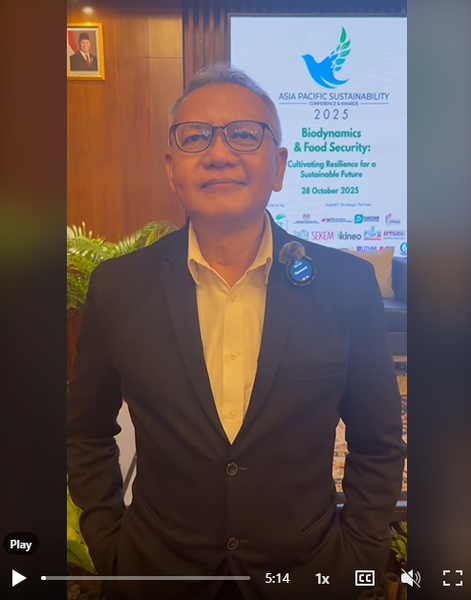
At the Asia Pacific hashtag#Sustainability Conference and Awards 2025, Encik Shamsul Bahar Mohd Nor shared the ARMS - ASEAN Resiliency Management System for Sustainability!
Hear and watch on the explanation from him directly!
- by Dr. Daniel Ng, Chairman of the Asia Pacific Sustainability CEO Circle (APSCC)
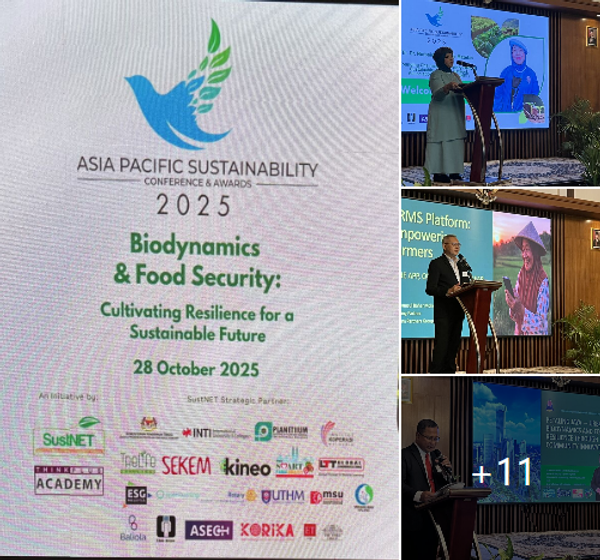
The SeRumpun Sustainability Mandate: A Living Call to Conscience
The two days of the Asia Pacific Sustainability Conference (hashtag#APSCA) in Bali were nothing short of exhilarating—an experience that stirred both the mind and the soul.
The conversations were alive with purpose, the speakers brilliant, and the delegates visibly inspired.
What stood out most wasn’t just the ideas shared on stage, but the spontaneous collaborations that sparked between sessions.
You could almost see the light bulbs flickering on—people from different backgrounds suddenly aligned to the same cause, sketching out real use cases on napkins instead of just discussing theories.
It was sustainability in motion.
The sessions explored how ASEAN’s future depends not only on climate adaptation but also on trust, inclusion, and shared accountability.
It became clear that sustainability isn’t a buzzword—it’s a bond.
Whether through regenerative agriculture, transparent water governance, or data-driven biodiversity protection, the energy in the room was one of optimism and purpose.
A highlight was the introduction of #Sustainix, a #blockchain-powered platform turning sustainability promises into verifiable proof.
Delegates saw how it could transform green claims into traceable, transparent, and trustworthy records—giving smallholders and innovators equal credibility alongside big corporations.
It symbolized a new era where sustainability isn’t declared; it’s demonstrated.
The conference culminated in a Biodynamics Tour to Asta Manah Liang, where participants witnessed sustainability come alive.
From biodynamic composting to community-driven circular farming, it was a living classroom where the principles discussed over two days were grounded in real soil—and real relationships.
As one participant said while watching a farmer pat his cow, “This is what sustainability feels like.”
That moment captured it perfectly: sustainability not as policy or product, but as partnership.
If APSCA 2025 reminded us of anything, it’s that Southeast Asia’s sustainability story will not be written in reports—it will be lived, together, by people whose light bulbs have just switched on.
- by Dr. Daniel Ng, Chairman of the Asia Pacific Sustainability CEO Circle (APSCC)

What a day!
What a practical lesson on hashtag#Biodynamics!
The Asia Pacific Sustainability Conference and Awards 2025 concluded with a practical lesson on Biodynamics with our tour to Asta Manah Liang, hosted by Ibu Putu swesty Prahayani and Pak Putu Gede Indra.
Heard by Ts Dr Norsaidatul Mazelan of SustNET Sustainable Business Network and THINKPLUS CONSULTING, we were shown how waste management is done fiat hand and with returns to the earth itself!
Mayors from #Malaysia’s Petaling Jaya and Sepang we present together with esteemed delegates from Singapore like Casey, Ong and yours truly Dr. Daniel CF Ng 伍长辉 博士 of Omni Integra, and Indonesia like Decy Fakhria Chalid were amazed by the results.
- by Dr. Daniel Ng, Chairman of the Asia Pacific Sustainability CEO Circle (APSCC)
I am honoured to be invited to speak, albeit impromptu, by Ibu Putu Swesty Prahayani and Pak Putu Gede Indra of Asta Manah Liang, to commemorate the Biodynamics Tour and to celebrate them as #Sustainix launch customer.
And spoke about The Cow!
- by Dr. Daniel Ng, Chairman of the Asia Pacific Sustainability CEO Circle (APSCC)
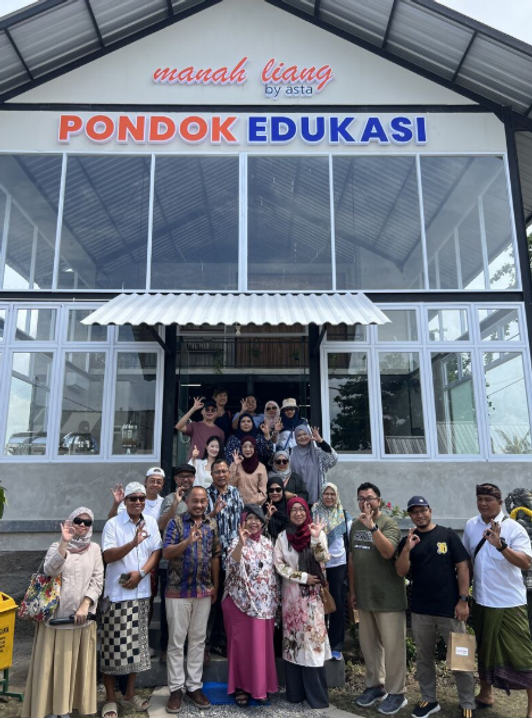
MEDIA RELEASE
For Immediate Release
29 October 2025 | Bali, Indonesia
Asta Manah Liang Becomes Launch Customer for hashtag#Sustainix, Pioneering #BeyondWaste Sustainability Verification in #Bali
Asta Manah Liang, a leading advocate of regenerative living and eco-conscious design in Bali, has been announced as the launch customer for Sustainix, a #blockchain-based sustainability verification platform.
This collaboration marks the first implementation of BeyondWaste, a new initiative that uses transparent, verifiable data to redefine how waste management and circular practices are tracked across businesses and communities.
Sustainix, co-developed by Baliola, SustNET Sustainable Business Network, THINKPLUS CONSULTING and Omni Integra, is a digital platform that leverages blockchain technology to ensure every sustainability action—from waste segregation to recycling and upcycling—is recorded, verified, and made publicly traceable.
Its “green certification” system enables businesses to move beyond symbolic environmental claims and demonstrate measurable progress with tamper-proof digital records.
Under the BeyondWaste program, Asta Manah Liang will implement a full-spectrum trace-and-verify model across its operations.
This includes tracking organic waste for composting, recyclable materials for repurposing, and partnerships with community waste collectors and artisans who turn discarded materials into value-added products.
Each stage of the process will be registered on the Mandala Chain, providing immutable proof of environmental compliance and community impact.
“Asta Manah Liang represents the essence of what we call living sustainability—not as a marketing message, but as a measurable way of life,” said Dr. Daniel CF Ng 伍长辉 博士, Managing Partner of Omni Integra.
“By becoming the first adopter of Sustainix for BeyondWaste, they are setting the benchmark for transparent, accountable, and locally relevant sustainability in #Indonesia.”
This pilot will serve as the blueprint for replicating traceable sustainability models across Bali’s hospitality, agriculture, and creative sectors—aligning local eco-practices with global #ESG standards.
Through this partnership, Bali takes a decisive step toward building trust in sustainability, where technology, tradition, and community collaboration converge to create a truly circular future.
- by Dr. Daniel Ng, Chairman of the Asia Pacific Sustainability CEO Circle (APSCC)

AS I WAS PASSING — The Cow That Connects
As I was passing a biodynamics shed in Bali, I stopped to watch a scene that felt both humble and profound — a farmer gently patting his cow, smiling as if greeting an old friend.
What I learned next was nothing short of inspiring.u
In this biodynamic farm, cows are not just livestock; they are the heart of a circular ecosystem — one that nurtures the soil, sustains livelihoods, and strengthens communities.
Each year, Ibu Putu swesty Prahayani gives a cow to her employees.
In return, the employees provide manure that enriches the compost and restores soil fertility — the foundation of biodynamic agriculture.
But this isn’t just about farming; it’s about family.
That single cow becomes a living investment — the employee can later sell it to pay for their children’s school fees or family needs.
What struck me most was the ripple effect.
This simple act keeps young people in the village, where they can work meaningfully instead of migrating to cities.
It also teaches the next generation about sustainability — not as a concept, but as a lived reality.
It’s where responsibility meets reward, and where ecology and economy find balance.
Through this beautiful exchange, a cow becomes more than an animal. M
It becomes a bridge — connecting people to the land, parents to children, and communities to purpose.
It ensures prosperity for the people while protecting the planet.
In a world obsessed with speed and profit, this quiet Balinese model reminds us that true sustainability is not only about renewable energy or carbon credits, but about renewing relationships — between humans, nature, and the cycles of life itself.
Sometimes, the simplest gift — a cow — carries the greatest wisdom: that caring for the earth begins by caring for each other.
- by Dr. Daniel Ng, Chairman of the Asia Pacific Sustainability CEO Circle (APSCC)

Ibu Thilma Komaling, the Tuna Lady, a label she wears with pride presented at the Asia Pacific Sustainability Conference and Awards 2025 at the Royal Tulip Springhill Resort - Jimbaran highlighting that tuna is facing extinction if we are not careful.
- by Dr. Daniel Ng, Chairman of the Asia Pacific Sustainability CEO Circle (APSCC)

#Indonesia’s path toward sustainability is rich with tradition, diversity, and innovation—but it also faces a growing crisis of trust.
From traditional Balinese weaving to agricultural exports and waste management systems, claims of being “eco-friendly” or “sustainable” abound, yet credible proof remains elusive.
This is where Sustainix can play a transformative role—by turning sustainability from a statement into verifiable, data-driven evidence.
Built on #blockchain technology, Sustainix provides a transparent and tamper-proof platform for tracking and tracing sustainability practices across multiple sectors.
Imagine a traditional Balinese textile cooperative that documents its entire production process—from natural dye sourcing to ethical labor practices—on the blockchain.
Buyers, both local and global, can scan a simple QR code and instantly verify its authenticity and sustainability record.
The same approach can be applied to agricultural products, allowing farmers to trace the journey of their produce from soil to shelf, ensuring fair trade, organic compliance, and reduced environmental impact.
In waste management, where accountability often breaks down, Sustainix offers a clear chain of responsibility.
Municipalities and private operators can log waste segregation, collection, and recycling activities transparently, restoring public trust in how waste is managed and disposed of.
This verifiable data can then inform smart city initiatives—feeding into dashboards that track energy usage, emissions, and community participation in real time.
By linking local industries, communities, and regulators through a common verification framework, #Sustainix helps Indonesia move toward a new model of governance—where transparency fuels trust, and trust drives sustainable growth.
As cities like #Denpasar, #Bandung, and #Surabaya advance toward smart urban ecosystems, Sustainix can serve as the connective tissue—bridging tradition and technology, local needs and global standards, and ultimately helping build a nation where sustainability is not just claimed, but proven and shared.
- by Dr. Daniel Ng, Chairman of the Asia Pacific Sustainability CEO Circle (APSCC)